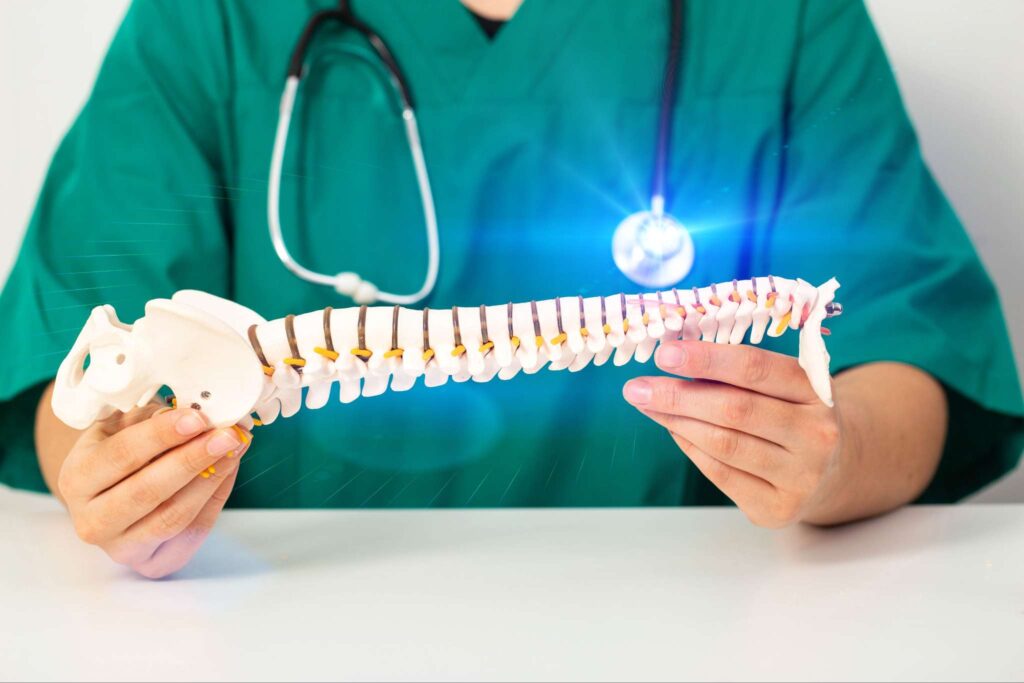 Have you ever felt like your back or neck pain is disrupting your daily life? Degenerative disc disease is a health condition in the spine that can cause pain and discomfort in the neck and back. This condition occurs when the discs between the vertebrae wear down over time, which decreases their ability to act as shock absorbers. By understanding what to avoid, you can learn how to better manage your degenerative disc disease symptoms and improve your quality of life.
Have you ever felt like your back or neck pain is disrupting your daily life? Degenerative disc disease is a health condition in the spine that can cause pain and discomfort in the neck and back. This condition occurs when the discs between the vertebrae wear down over time, which decreases their ability to act as shock absorbers. By understanding what to avoid, you can learn how to better manage your degenerative disc disease symptoms and improve your quality of life.
5 Ways Degenerative Disc Disease Can Affect You
Degenerative disc disease is a condition that can significantly impact your everyday routines, from physical activities to your mental health. Here are common degenerative disc disease symptoms so you can understand how this disease might feel to you.
- Pain and Discomfort: Degenerative disc disease commonly causes pain in the back or neck, which can range from mild to severe. This pain is usually localized but can also radiate to other areas, like the arms or legs if nerves are involved.
- Reduced Mobility: Degenerative disc disease can lead to stiffness and discomfort, which can limit your range of motion. Regular activities like bending, twisting, or reaching can be difficult or painful.
- Nerve Damage: As discs degenerate, they may herniate or bulge, pressing against nearby nerves. This can cause symptoms such as numbness, tingling, or shooting pain into the extremities.
- Muscle Weakness: When nerves get compressed, it can also lead to muscle weakness, especially in the arms and legs. This can negatively impact your balance, coordination, and overall strength.
- Sleep Disturbances: Neck or back pain from degenerative disc disease can interfere with sleep quality, leading to chronic fatigue. A lack of restful sleep can impact your concentration, memory, and healthy functioning.
Top 5 Things to Avoid with Degenerative Disc Disease
Whether you are looking for things to avoid with degenerative disc disease in the neck or lower back, here are some examples.
Avoiding a Sedentary Lifestyle
One of the most important things to avoid when managing degenerative disc disease is living a sedentary lifestyle. A lack of activity can weaken the muscles that support your spine, causing increased pain and stiffness. Here’s how you can increase your activity levels without overdoing it:
- Try Low-Impact Exercises: Activities like walking, swimming, or cycling are great ways to keep your body moving without putting too much strain on your spine. Gentle yoga or Pilates can also help with flexibility and reducing muscle tension. These low-impact exercises help promote flexibility and strength in your back and core muscles.
- Take Frequent Breaks: If you have a desk job, make it a habit to stand up, stretch, and walk around every hour. Doing this can help relieve pressure on your spine and help prevent you from developing stiffness when you go from sitting to standing.
Ignoring the Benefits of Ergonomic Support
A comfortable work setup can significantly impact people with degenerative disc disease. Poor ergonomics can put too much strain on the spine. Here are some tips to improve your ergonomics in your life:
- Set Up Your Workspace: You want a chair that supports the natural curve of your spine. Adjust your chair height so that your feet rest flat on the floor and your knees are bent at a 90-degree angle. It also helps to position your computer monitor at eye level to prevent neck strain by looking too far up or down.
- Try Ergonomic Accessories: Consider using lumbar support pillows, wrist rests, or standing desks to boost your comfort and support. Ergonomic keyboards and mice can also reduce strain on your neck and shoulders while working at a computer for hours.
Overlooking Nutrition and Hydration
A well-balanced diet plays a key role in managing health conditions like degenerative disc disease. Getting the best nutrients can support your spinal health and reduce inflammation. Here are a few nutrition tips to consider:
- Stay Hydrated: Drinking plenty of water helps your whole body, including keeping your spinal discs hydrated, which helps maintain their flexibility and cushioning. A general recommendation is to aim for at least eight glasses of water a day.
- Eat Anti-Inflammatory Foods: You can try incorporating foods that are rich in omega-3 fatty acids, such as salmon, walnuts, and flaxseeds, which help reduce inflammation. Leafy greens, berries, and nuts are also great choices thanks to their anti-inflammatory properties.
Forgetting to Manage Your Stress
Stress can significantly impact your whole body and can even lead to muscle tension that aggravates symptoms of degenerative disc disease. Here are some strategies to manage your stress effectively:
- Exercise Regularly: Exercise is a powerful stress reliever that also helps maintain physical health. You can even choose activities that you enjoy and find relaxing, like going for a gentle walk or taking a yoga class.
- Getting Plenty of Sleep: Getting enough rest is important for managing your stress and allowing your body to heal. Create a regular sleep routine and set up a restful environment to promote a better quality of sleep.
Avoiding Routine Check-Ups with Your Doctor
Regularly visiting your doctor is important to managing your degenerative disc disease effectively. If you skip appointments it can lead to missed opportunities managing your symptoms and getting the treatment you need.
- Attend Regular Check-Ups: Visit your doctor regularly to monitor the progression of your degenerative disc disease. They can help you best manage your symptoms and recommend various treatment options.
- Share Any Symptom Changes: If you notice any new or worsening symptoms, it’s important to let your doctor know. Addressing this as early as possible can prevent complications.
Treatment Options for Degenerative Disc Disease
 Managing degenerative disc disease typically involves a combination of lifestyle modifications and professional treatments. Here are some common treatment options:
Managing degenerative disc disease typically involves a combination of lifestyle modifications and professional treatments. Here are some common treatment options:
- Chiropractic Care: Chiropractors use spinal adjustments to improve healthy alignment, reduce pain, and increase your mobility.
- Physical Therapy: Physical therapists can design personalized stretching and exercise programs to strengthen muscles, improve flexibility, and alleviate pain.
- Medications: Over-the-counter pain relievers like ibuprofen or acetaminophen can help manage mild pain. For more severe pain, your doctor may prescribe stronger medications or recommend corticosteroid injections.
- Surgery: In severe cases where conservative treatments do not relieve your symptoms, your doctor may talk to you about surgical options. Procedures such as spinal fusion or disc replacement can relieve pain and stabilize your spine.
How Your AICA Atlanta Doctor Can Help
Degenerative disc disease can be challenging to manage, but by avoiding these common pitfalls and trying healthier habits, you can reduce your symptoms. Visit AICA Orthopedics in Atlanta for a personalized treatment plan and a team of doctors dedicated to helping improve your quality of life.
